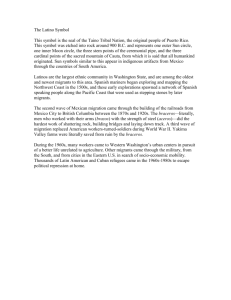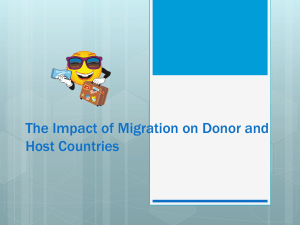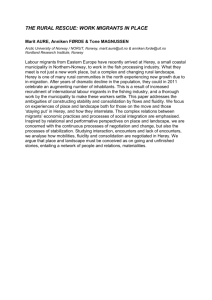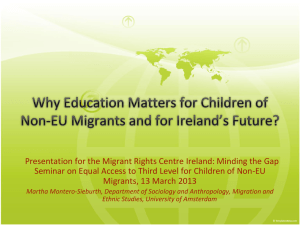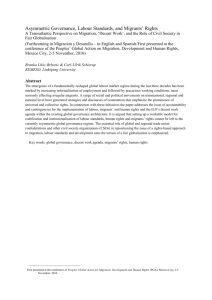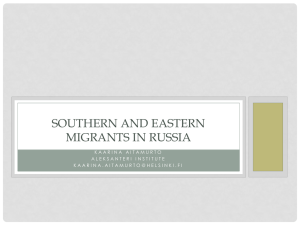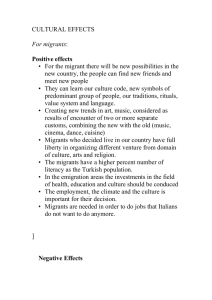THE THIRD GENERATION HYPOTHESIS given at the CRC/RCCG
advertisement
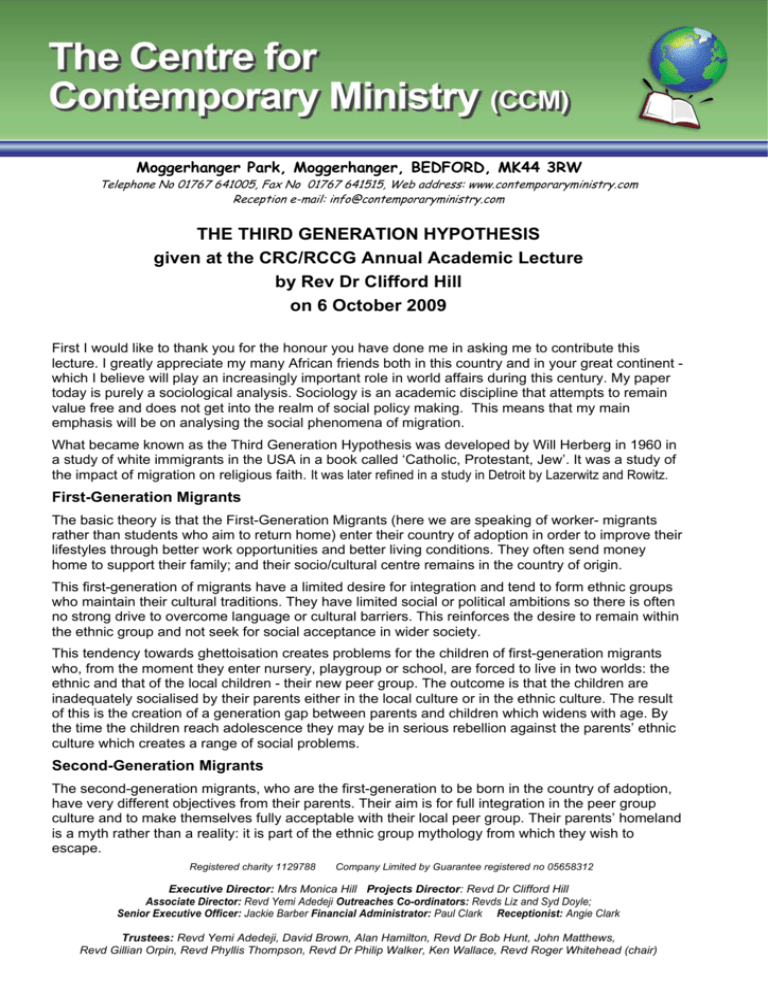
Moggerhanger Park, Moggerhanger, BEDFORD, MK44 3RW Telephone No 01767 641005, Fax No 01767 641515, Web address: www.contemporaryministry.com Reception e-mail: info@contemporaryministry.com THE THIRD GENERATION HYPOTHESIS given at the CRC/RCCG Annual Academic Lecture by Rev Dr Clifford Hill on 6 October 2009 First I would like to thank you for the honour you have done me in asking me to contribute this lecture. I greatly appreciate my many African friends both in this country and in your great continent which I believe will play an increasingly important role in world affairs during this century. My paper today is purely a sociological analysis. Sociology is an academic discipline that attempts to remain value free and does not get into the realm of social policy making. This means that my main emphasis will be on analysing the social phenomena of migration. What became known as the Third Generation Hypothesis was developed by Will Herberg in 1960 in a study of white immigrants in the USA in a book called ‘Catholic, Protestant, Jew’. It was a study of the impact of migration on religious faith. It was later refined in a study in Detroit by Lazerwitz and Rowitz. First-Generation Migrants The basic theory is that the First-Generation Migrants (here we are speaking of worker- migrants rather than students who aim to return home) enter their country of adoption in order to improve their lifestyles through better work opportunities and better living conditions. They often send money home to support their family; and their socio/cultural centre remains in the country of origin. This first-generation of migrants have a limited desire for integration and tend to form ethnic groups who maintain their cultural traditions. They have limited social or political ambitions so there is often no strong drive to overcome language or cultural barriers. This reinforces the desire to remain within the ethnic group and not seek for social acceptance in wider society. This tendency towards ghettoisation creates problems for the children of first-generation migrants who, from the moment they enter nursery, playgroup or school, are forced to live in two worlds: the ethnic and that of the local children - their new peer group. The outcome is that the children are inadequately socialised by their parents either in the local culture or in the ethnic culture. The result of this is the creation of a generation gap between parents and children which widens with age. By the time the children reach adolescence they may be in serious rebellion against the parents’ ethnic culture which creates a range of social problems. Second-Generation Migrants The second-generation migrants, who are the first-generation to be born in the country of adoption, have very different objectives from their parents. Their aim is for full integration in the peer group culture and to make themselves fully acceptable with their local peer group. Their parents’ homeland is a myth rather than a reality: it is part of the ethnic group mythology from which they wish to escape. Registered charity 1129788 Company Limited by Guarantee registered no 05658312 Executive Director: Mrs Monica Hill Projects Director: Revd Dr Clifford Hill Associate Director: Revd Yemi Adedeji Outreaches Co-ordinators: Revds Liz and Syd Doyle; Senior Executive Officer: Jackie Barber Financial Administrator: Paul Clark Receptionist: Angie Clark Trustees: Revd Yemi Adedeji, David Brown, Alan Hamilton, Revd Dr Bob Hunt, John Matthews, Revd Gillian Orpin, Revd Phyllis Thompson, Revd Dr Philip Walker, Ken Wallace, Revd Roger Whitehead (chair) CRC/RCCG ANNUAL ACADEMIC LECTURE 2009 Clifford Hill 6 October 2009 Present reality is the country of their birth and it is their ambition to achieve in their birth country rather than in the unreal world of their parents. The ethnic group culture is often seen as a barrier to integration. For many this means rejecting the norms of the parents and adopting peer group norms which they see as essential to the achievement of their objectives. The reality is that few actually succeed in their socio-economic ambitions, which leaves the majority disappointed. The outcome is often a collective anomie that often characterises second-generation migrants who struggle with two cultural identities. Third-Generation Migrants The objectives of the third-generation migrants are very often determined by the experience of their parents. If the parents have achieved full integration their children will often react against the local culture and seek to discover a distinctive identity by searching for their roots in their grandparents’ homeland. This can go in one of two ways. If the individual achieves socio-economic security, he or she is happy to display their distinctive cultural identity while still playing a full part in the wider society. If, on the other hand, the individual is insecure, the tendency is to reject the peer group culture and look for security in traditional cultural groups the outcome of which is alienation from wider society. Summary In summary, the third-generation theory states that the first-generation of worker migrants is usually characterised by economic motives but a lack of socio/political ambition or expectations of social integration. They continue to identify with the culture and norms of their countries of origin. The second-generation seek full integration and therefore conform to the norms of the local peer group and reject the culture of their parents’ ethnic group. The third-generation by contrast, if they are feeling secure in their peer group will search for a distinctive identity in their family roots. The theory was developed in America among white migrants mainly Europeans and is only partially applicable to the British situation where ethnicity makes it impossible for migrants of African origin to merge indistinguishably in white majority British society. West Indian Migrants from 1948 First-Generation Migrants I want now to look at the situation of those whose origins are in the West Indian islands. Many of the first group who came on the Empire Windrush in 1948 had served in the British Armed Forces during the Second World War. Having returned to their home environment where economic prosperity was limited they decided to return to Britain where prospects were much more advantageous. Their objectives were similar to most first-generation migrants in seeking better work and living conditions. They not only sent money home for family support but also to pay the fare of another family member to join them. Their socio-cultural centre remained in their countries of origin but ethnic groups and in particular West Indian-led churches formed an important cultural centre and ex-patriot support network. The migrants quickly adopted some of the norms of the local society particularly in terms of family and marriage. Throughout the 1950s and 60s thousands of young couples married and set up house together. This contrasted only in age with Caribbean culture where marriage was linked with socioeconomic status and therefore was usually delayed until middle age. The couples were soon able to earn considerably more than they could in the Caribbean and marriage marked their new socio-economic status. But in their ethnic culture, family and marriage were part of a matriarchal culture in which the grandmothers care for the upbringing of the children. This was rooted in slavery where on many plantations marriage was forbidden to slaves under British colonial law until 1838. The grandmother culture developed after the abolition of the slave trade in 1807 when further imports from West Africa were illegal and the only source of additional labour was through population The Third Generation Hypothesis 2 CRC/RCCG ANNUAL ACADEMIC LECTURE 2009 Clifford Hill 6 October 2009 expansion. The strongest male slaves were encouraged to have as many children as possible and the older women who were too weak for the field gangs became the child carers to the community. But in Britain there were no grandmothers which put an inordinate strain upon the young mothers whose income was needed to meet the family budget and who struggled with the three roles worker, mother and wife. The result was a high rate of family breakdown and many children being inadequately socialised. The outcome was a severe generation gap between parents and children. Second-Generation Migrants The objectives of the second-generation migrants were full integration with the peer group in the local communities where they had been born and where they went to school. For many there was a problem of identity. They were black on the outside and white inside. Their parents still related to the culture of the Caribbean islands from which they had emigrated but the culture, patois and mythology of the West Indies was alien to the children born in Britain. They struggled with the two identities and the desire for acceptance usually entailed rejection of the norms of their parents and the adoption of local peer group norms. For many of the secondgeneration there was the additional struggle to attain educational qualifications in schools that were often part of the rundown inner-city environment where they grew up. It was an unequal struggle in which few succeeded in socio-economic terms. The outcome was a generation characterised by anomie. Third-Generation Migrants The third-generation British African Caribbeans struggled to discover a distinctive identity. Many of them came from broken families with insecure parents who had produced dysfunctional family homes. They were unsure of their own identity and lacked a sense of purpose. Their parents were often unable to inspire them to achieve educational qualifications and gain social acceptance in the wider peer group culture. Their parents were also unable to provide them with a sound basis for personal and social morality. This resulted in the formation of gangs as a substitute family. The gang provides identity, belongingness, security, protection and comfort. Many third-generation children reject the norms of what they see as a hostile society in which they cannot hope for social acceptance or economic achievement. The outcome is the formation of a counter-culture with its own ‘in-group norms’ and a form of alienation from wider society. African Migrants from 1960s and 1980s First-Generation Migrants Very few Africans came to Britain in the first wave of the 1960s. Those who came were mainly from West Africa from upper-class families who sent them to Britain as students for advanced education. Their objectives were to gain educational qualifications and return to Africa. Most of them had no desire to settle in Britain and returned to Africa where they formed a new educated professional middle-class elite often locally known as the ‘Been Tos’ - those who had been to Europe for their further education. Many of these professional elite were disappointed with the social and political situation in Africa. In the 1980s and 1990s a second wave of Africans began coming to Britain in considerable numbers. Their objectives were to improve their standard of living and give their children better life chances than they would have in Africa. Some were returning and others sent their children as firstgeneration migrants. Their cultural centre remained in their original African communities and the ethnic groups that have been created in Britain. African-led churches form an important part of the expatriate community and provide an opportunity to relax in congenial company freed from the constraints of functioning in a society where acceptance is not guaranteed and in which cultural norms are not fully understood. This generation is mainly middle-class with leadership drawn from the professional classes who have a high level of motivation, ambition and entrepreneurship with strong desires for social integration and achievement ambitions for their children. The majority, however, have limited desires for integration and are content to satisfy their social needs within the The Third Generation Hypothesis 3 CRC/RCCG ANNUAL ACADEMIC LECTURE 2009 Clifford Hill 6 October 2009 African émigré community. They do not find it easy to enter the world of their children. The outcome is a generation gap. Second-Generation Migrants The objectives of this second-generation who are first-generation Africans born in Britain is full integration with their local peer group. Many, however, are unsure of their identity growing up in two cultures: the world of their parents which is part of the ethnic mythology from which they try to distance themselves in the transition from childhood to adolescence: and the world of school and local peer group norms which become increasingly important to them. Like the second-generation of Caribbean children they too suffer the role conflict of being black on the outside and white inside. They know that if they are to achieve in socio-economic terms in wider society they have to conform to the norms of that society. Many of them have parents who are highly ambitious for their children and put pressures upon them to succeed in obtaining educational qualifications which will lead to professional careers. There are several factors that militate against educational attainment. These are: 1) If they are living in a working-class area the schools may not be of a particularly high standard 2) The local working-class norms do not encourage academic success 3) Black British culture has largely been formed by the Caribbean second and third generations whose counter-culture norms are contrary to academic success The outcome for many of these young people is a struggle to find their identity in a clash of cultures. On the one hand there is the desire to please parents, or at least not to incur the wrath of parents, and on the other hand the desire for peer group acceptance. Many of these young people turn away from the faith of their parents. In many ways their situation is more difficult than that of the Caribbeans’ because their ethnic culture is patriarchal in contrast to the Caribbean matriarchal. It is authoritarian rather than liberal. The pressures upon these young people can therefore often be intense leading to depression or ill-health. I would like to emphasise that the core of the problem facing Christian parents and young people in the African community is not racial or ethnic in essence. It is a clash of cultures and it needs to be understood in this context if parenting is to be successful and young people are to survive the traumas of adolescence and become well adjusted young adults with their faith undamaged and their socio-cultural values in accordance with biblical standards. It is here that I can speak from personal experience as the whole of my pastoral ministry has been in inner-city areas of London. My wife and I have pastored churches in Tottenham, the East End of London and in Lambeth south London - all ethnically mixed working-class inner-city areas with all the problems that characterised these kinds of area. All our three children grew up in the East End and we often cried out to God for help and wept for our children. We were there because we believed God had called us to take the gospel there but our children had no choice. They had to interact in the local culture and make their friendships with local children who often came from families with very different values from our own. We had to supplement their education but we constantly talked to our children and discussed the difference between the biblically based Christian values in our family and those they encountered in the neighbourhood. We discovered that this openness worked and that our children were able to cope with living in two contrasting cultures. Prayer and worship in the family helped to strengthen them for the situations they had to face in daily life. All three not only survived but are now committed Christians. Parents whose children are encountering a culture clash need to understand the pressures upon their children and to be wise enough to know when to be firm and when to relax. Family time together is precious and open discussion of the values of a Christian family and those in secular society is absolutely essential if Christian parents are to have the joy of seeing their children grow into committed Christian adults. It’s a challenge; but it can be done! Clifford Hill 06.10.09 The Third Generation Hypothesis 4

